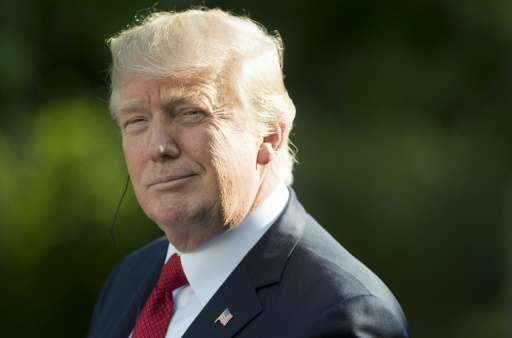US President Donald Trump's decision to walk away from the Paris climate deal appears to have galvanised US mayors to take action on their own
President Donald Trump's decision to pull out of the Paris climate accord has triggered a bipartisan push from US mayors to stick to the emissions cuts Washington had pledged to hit, the mayor of Atlanta said Tuesday.
Mayor Kasim Reed said he was sending a signal of "optimism, passion and action" on fighting climate change to mayors worldwide despite the pullout Trump announced this month.
"President Trump's disappointing decision to withdraw from the agreement will actually have the opposite effect in terms of execution," Reed told a meeting of mayors from Asia, Africa, Europe, South America and North America in Brussels.
"What we did not have really was the level of cooperation, passion and intensity until we saw our president's decision to withdraw," Reed said.
Trump caused outrage when he decided to withdraw the United States—the world's second-largest emitter of greenhouse gases—from the 2015 accord which is meant to curb rising temperatures driven by human activity.
'Watch out' for cities
Trump said the pact, signed by nearly 200 countries, hit the United States with "draconian financial and economic burdens" while competitors got off lightly.
Reed said he had attended a meeting in Miami on Saturday where more than 300 US mayors from both the Democratic and Republican parties pledged to honour the commitments Trump's predecessor Barack Obama agreed to in Paris.
The meeting showed this "is not a partisan issue," the Democratic mayor said.
"I won't go as far as to say we can reach the exact same goals as we could have with national leadership," Reed told AFP later.
But he said cities could do enough to keep the ball rolling until the arrival of a new US president committed to the Paris agreement.
He cited experts who argue that cities can achieve 35 percent to 45 percent of the targeted emission cuts without the involvement of national governments.
The Paris agreement calls for keeping average global warming below two degrees Celsius (3.6 degrees Fahrenheit) above pre-industrial levels, and at 1.5 Celsius if possible.
Mayor Gregor Robertson of Vancouver suggested that Trump look north to see how voters in Canadian cities had changed the political map by having Justin Trudeau, a champion of the Paris pact, replace his opponent Stephen Harper for the premiership in 2015.
"The Trump administration had better watch out for US cities," Robertson said.
"They're on the rise and I think will prevail in the end at turning the tide and making sure the US is a climate leader," he told the gathering.
'Stronger than ever'
Maros Sefcovic, the European Commission vice president for energy who co-chaired Tuesday's meeting of mayors, said momentum from cities and other players was "stronger than ever before" despite Trump's decision.
Former New York mayor and billionaire philanthropist Michael Bloomberg, who was to join world mayors in Brussels later Tuesday, announced a $200 million plan Monday aiming to back innovative policies in American cities.
Bloomberg will join a board meeting of the Global Covenant of Mayors for Climate and Energy, which represents 7,451 cities worldwide and nearly 700 million people, or nine percent of the global population.
Sefcovic said he expected that mayors from China, the world's biggest emitter of greenhouse gases, would soon be "very strongly represented" in the covenant, though there are none from mainland China currently.
The C40 club of mayors of top cities on Monday called on G20 leaders to strongly support the Paris pact—even though they are now only 19 after Trump's pullout—when they meet next month in Hamburg, Germany.
© 2017 AFP























